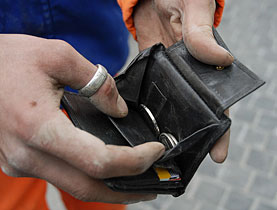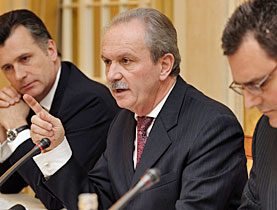Looming recession raises debt question

Most people in Switzerland oppose increasing the national debt and want state spending slashed and taxes reduced, according to a recent survey.
But a leading UBS economist has warned that the public might have to accept extraordinary measures, including expensive economic stimulus packages, as the world slips into a recession many fear will last a long time.
The results of the “financial monitor” survey, published on Wednesday, showed overwhelming support for tax cuts, government frugality and an aversion to debt.
The survey, conducted by the Swiss Business Federation, economiesuisse, and by the polling institute gfs.bern, took the pulse of 1,010 people.
A large majority (85 per cent) thought the state could cut more costs, mainly in the defence portfolio, the asylum system and the diplomatic service. Nearly three quarters of respondents wanted both state expenditures and taxes lowered simultaneously. Only three per cent supported increasing the national debt.
Last month, the Swiss government announced a SFr1.5 billion ($1.26 billion) package of measures designed to stimulate the economy next year – a programme that pales in comparison with other those of countries, including the United States, which could spend up to $1 trillion.
The European Union has also agreed to pour €200 billion (SFr313 billion) in member state economies. But national debts will rocket as a consequence of these packages.
Clear message
Pascal Gentinetta, the director of economiesuisse, told swissinfo that the survey sent a clear message to the Swiss government not to follow in the footsteps of neighbouring countries.
“The public wants to avoid massive indebtedness even in times of recession,” he said. “They want politicians to take it step by step and to spend wisely rather than react with impulsive packages.”
But Klaus Wellershoff, chief economist at UBS, believes the attitude of many of those surveyed in the summer may have changed by now or could change when faced with the harsh realities of a recession.
“Under normal circumstances people don’t like public debt that burdens future generations. But things have turned extremely negative and we now have to brace ourselves for a much larger real recession with unemployment rates going up to four per cent,” he told swissinfo.
“We have to brace ourselves for a situation when governments try to re-stabilise the economy. I expect politicians will find way of enacting policies that will allow unusual spending programmes. Politicians will go all the way to prevent this recession turning into a depression.”
No tax breaks
Wellershoff also warned the public not to expect the tax breaks they might have hoped for in the near future.
“I think we will see a general tendency not to cut taxes and give the money back to the people because we stand a chance that they might just save it,” he said.
“As a politician I would not be too afraid of adverse public reaction to these policy measures because the change in living circumstances will be noticeable,” he added.
“Any politician that sits back and does nothing, saying they want a balanced budget and to cut back expenditure, probably won’t be re-elected.”
swissinfo, Matthew Allen
1990: 32.2%
1995: 48.4%
2000: 51.8%
2005: 52.7%
2006: 47.5%
2007: 43.7%
2008: 40.5%*
2009: 37.1%*
*estimated
(Source: National Statistics Office, released August 2008)
SNB: -0.5 to –1.
economiesuisse 0%
BAK Basel Economics: 0.7%
KOF Business Institute: 0.3%
Credit Suisse: 1.0%
UBS: 0.2%

In compliance with the JTI standards
More: SWI swissinfo.ch certified by the Journalism Trust Initiative




You can find an overview of ongoing debates with our journalists here. Please join us!
If you want to start a conversation about a topic raised in this article or want to report factual errors, email us at english@swissinfo.ch.